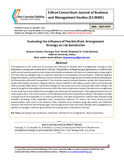Evaluating the Influence of Flexible Work Arrangement Strategy on Job Satisfaction

View/
Date
2019-11Author
Onyango, Simpson Osiemo
Chepkilot, Ronald
Muhanji, Stella
Metadata
Show full item recordAbstract
The objective of this study was to evaluate the influence of flexible work arrangements strategy on job satisfaction among state corporations in Kenya. The greatest challenge facing organisations is whether their staffs are motivated to perform their duties and whether employees find their work interesting and meaningful. The ways jobs are designed has an important bearing on an employee’s job satisfaction. Understanding job design techniques and their influence on job satisfaction will lead organisations to keep the best employee pool for themselves and fend off competition. This study was based on several theories, namely: Job Characteristics model, Hertzberg's two-factor Hygiene theory, Clayton Alderfer’s ERG theory, equity theory, family-boarder theory, and boundary theory. The research design for this study was a cross-sectional descriptive design. This research sought to interrogate the extent to which the state corporations employ flexible work arrangements and its influence on job satisfaction and suggest possible areas of improvement. The target population was 187 state corporations. The unit of analysis was employees of the state corporations in Kenya. The research studied a sample size of 381 employees in 127 state corporations. The state corporations in Kenya were selected using stratified sampling, while employees were purposively selected. To obtain the data, semi-structured questionnaires were used in this research. Data collected were analysed using descriptive and inferential statistics with the aid of the SPSS package. The findings of this study show that a flexible work arrangement is a significant strategy in enhancing job satisfaction among state corporations in Kenya.
Collections
- Publications 2019 [91]
